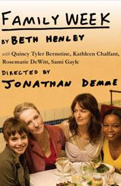What's Up, Jonathan Demme? The Oscar Winner on Family Week and What Movie He Wants to Hit the Stage
Did you know the director of Silence of the Lambs is a Mamma Mia! fan? You do now. Academy Award winner Jonathan Demme is the mind behind numerous nuanced dramas like Beloved, Philadelphia and Rachel Getting Married. He’s also, as it turns out, a total theater junkie, one who’s making his long-awaited stage-directing debut at MCC Theater with Beth Henley’s four-woman family drama Family Week. We checked in with Demme to get the scoop on his jarring jump from screen to stage—and discovered the uber-friendly helmer is having the time of his life in the theater.
Why make your stage directing debut with this play?
I’ve always loved theater, so reading and seeing Family Week in its original version about 10 years ago was part of it. I’m a big Beth Henley fan; I saw Crimes of the Heart with the original cast. I thought this play was extraordinary, so heartfelt and bold in the way that it dares to combine humor with heartache. To me [it is] evidence that Beth Henley is one of our finest American playwrights.
You say you love theater. What types of shows are you into?
Anything that’s good. That can range from Mamma Mia! to Ruined, the latter of which is another key part of my strange journey to directing a play. I was just so thrilled and moved by it. My excitement made me think, “Movies are great, but nothing competes with [a play] like this moving you live.” So when I ran into Beth a year ago, I asked if she’d be interested in doing Family Week together. She was. I called [MCC Artistic Director] Bernie Telsey, my genius casting director on Rachel Getting Married, and next thing I knew, we were planning to do it.
There were so many theater faces in Rachel Getting Married. Was that your idea?
I wanted Rachel to be a completely New York cast and to populate the film with—for me—new faces. I told Bernie, “Bring me your favorites.” One of them happened to be [Ruined and Family Week’s] Quincy Tyler-Bernstine. She was so amazing and agreed to play this little part in the movie. Now, this is the director’s ego at work: When you see someone as fantastic as Quincy, you want to be part of that ascending arrival for that actor. So she was the first person I thought of for the part of Rickey in this play. One of my great joys in this play is that I got to work intensely with her.
As a film guy, was there any part of directing a play for which you were you unprepared?
In movies, first the acting happens, then choices are made and edited together. Then music is added to that. Then the film goes to the lab so the lighting is beautiful. With this play, we rehearsed for four weeks—then suddenly we’re all in the room with the sound, lighting, set and costume designer. Everything was happening at once. It was exciting and exhausting.
You’ve got a great cast in your four stars. What did they teach you?
They taught me about the need for a "table reading"—is that what they call it?
Yep, you got it.
Well, they taught me that. I’m a “Hey, let’s get up and start doing this” guy, which is what I did do—just had them get up immediately and started blocking out the show—to their relative horror. Then it became clear I had to do this “table read” thing, where we sat down and read the play and discussed it. I found it tremendously exciting, and I think it’s improved my direction. Afterward I thought, “This is great job! Going in a room with a group of actors, talking about a play, watching them do the show, then grabbing dinner?” I really like this work a lot.
A lot of your resume is dark, dramatic, even scary. Have you ever wanted to do a farce?
I would. A couple of months ago, I saw The Royal Family on Broadway. I thought then I would love to do some really smart, out-there funny stuff like that, although that show had some dark moments too, so I’m not sure what that says about me. God, did that sound pretentious? I hope not. Point is, I would love to do some funny work like that, please.
You’re an Academy Award winner. How does having a prize like that change your life?
It heightens one’s ability to get a better table almost anywhere! [Laughs.] And it gives one access to a wider range of possibilities creatively, which is such a blessing.
Are there any downsides?
To having an Oscar? Ha! No. I’m gazing at it up on top of my refrigerator, and I’ve gotta be honest—I’m so glad I’ve got it!
Which one of your movies would you like to adapt for the New York stage?
Oooh, that’s fun. Do I have an unlimited budget?
Sure. Dream big.
I’d love to do Beloved as a musical. That would be amazing. And I’d kind of want to freeze the movie cast and bring them right to stage. But it’s best we not fantasize about it anymore. If I think about it too much I’m going to start pitching it to people!
